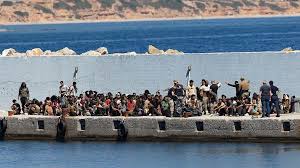Greek lawmakers are poised to pass a controversial new law that would temporarily suspend asylum applications from migrants arriving from North Africa for a minimum of three months a move that human rights organizations have strongly condemned as illegal under international law.
The legislation, expected to be approved by Friday due to the ruling New Democracy party’s parliamentary majority, comes amid a sharp rise in migrant arrivals to the island of Crete. The proposed law also includes provisions that would allow Greek authorities to carry out immediate deportations without conducting prior identification or asylum screening, raising alarm among legal and humanitarian experts.
Migration Minister Thanos Plevris defended the bill during a heated parliamentary session, stating, “From now on, the road for illegal migrants is go to jail or go back to their country. This is not a normal migrant flow, it is an invasion into Europe.”
This legislative shift follows the abrupt collapse of migration talks between Greece and Libya’s Benghazi-based eastern government earlier in the week. The breakdown of these discussions has further strained regional efforts to curb migration across the Mediterranean.
Greece has long served as a key entry point into the European Union for refugees and migrants fleeing conflict and poverty in the Middle East, Asia, and Africa. Since Prime Minister Kyriakos Mitsotakis took office in 2019, his government has implemented stricter border controls, expanded fencing along northern borders, and intensified maritime patrols in the Aegean Sea.
If enacted, the suspension of asylum applications from North Africa will mark a new chapter in Greece’s increasingly hardline immigration policy one that could potentially set a precedent for other EU border states. Rights groups are expected to challenge the law both domestically and at the European level, citing violations of the Geneva Convention and EU asylum directives.














Leave a comment